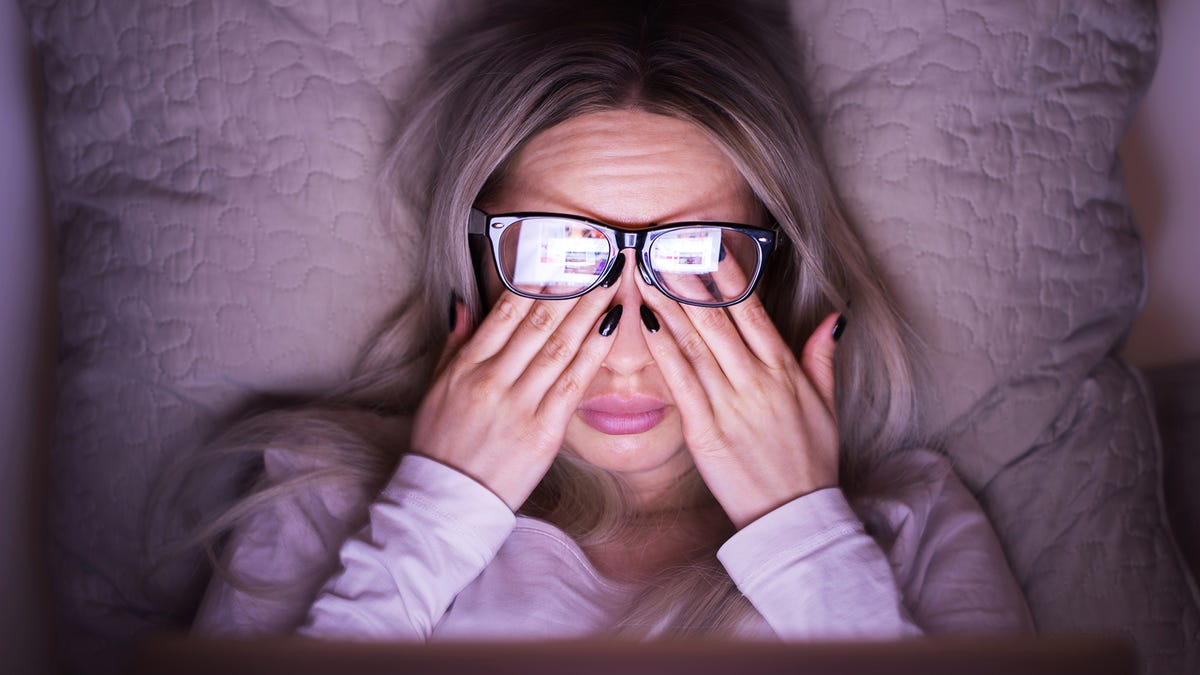 Why You Can Trust CNET
Why You Can Trust CNET Blue Light Glasses Don't Protect You From Eye Strain. Here's What Does
Blue light glasses are helpful for some things, but not so much for eye strain. Use these tips instead.

Extended exposure to your laptop screen can cause symptoms of eye strain.
It's easy to spend a lot of time looking at a screen, especially if you rely on your laptop, phone, monitors and other tech for work. But excess screen time can cause physical harm and eye irritation: research shows 50% to 90% of remote workers experience symptoms of digital eye strain.
Blue light blocking glasses have become popular for protecting your eyes from screens. But while blue light glasses do help protect your sleep-wake cycle from blue light, they aren't so effective in preventing computer vision syndrome, eye strain caused by prolonged exposure to a device screen.
Symptoms of CVS include:
- Dry, itchy eyes
- Red eyes
- Headache
- Blurry vision
- Muscle spasms
- Neck ache
We're not saying to get rid of your blue light glasses altogether. They're particularly helpful for sleep and when you're using your device in the evening closer to bedtime. But when it comes to eye strain, the tips below will help you protect your eyes when glued to your screen.
7 tips for preventing digital eye strain
1. Minimize glare (try the visor test)
Cup your hands around your eyes like you're wearing a baseball cap, and look at your screen. If you notice an improvement in vision or eye comfort, there is likely too much glare in your space. Adjust the lighting by closing your windows or try a laptop shade visor.
One quick fix for this issue is the Glare Stomper, and it retails for just under $30 on Amazon.
2. Keep the brightness down at night
Minimize your screen's effect on eye strain by turning down the brightness of your device in low-light conditions. Many devices have an auto-brightness setting that'll adjust its screen's illumination based on your environment's lighting.
One iPhone feature allows you to reduce your screen's brightness even lower than you can in the standard display settings menu.
3. Distance yourself from your screen
- Keep your computer or laptop in an optimal position on your desk to reduce eye strain and neck aches.
- Keep your device 20 inches away from your eyes -- about an arm's length.
- Keep your device in front of your face rather than the side to prevent added strain on your neck.
- According to Penn Medicine, the optimal position is to keep the center of your screen 4 to 8 inches lower than eye level to minimize exposed areas of the eye and relieve tension on the neck.
4. Take regular screen breaks
This one goes out to all the gamers and work-from-homers who spend prolonged periods of time in front of their devices. Looking at a screen close up for an extended time contributes to eye strain, so you want to increase the viewing distance during your break.
A good rule of thumb is to give your eyes a 15-minute break after every two hours of screen exposure. It'll give your eyes well-deserved rest from your laptop or phone screen, and your mind and muscles a chance to relax.
You can also try the 20-20-20 rule. Look at an object in the distance around 20 feet away for about 20 seconds, and do it every 20 minutes.
5. Practice good posture
Sitting properly at your desk can make a big difference.
It's easy to rest in a hunched position in front of your desk, but sitting with good posture can help relieve strain on your neck, back and eyes.
- Position your chair height where your knees are at a 90-degree angle.
- Keep your feet flat on the floor.
- Sit up straight against your chair's backrest.
- Keep your arms at a 90-degree angle on the chair's armrests.
- Your computer's mouse should be within a short distance so it's easy to reach
6. Keep reference materials near
If you have to look back and forth between a paper or other reference materials and your computer screen, make sure those materials are right next to your computer. This will reduce jerky eye and neck movements that cause added strain. A document holder is pretty cheap and keeps your papers upright and near your computer screen.
7. Good ol' eye drops
One cause of CVS is dry and itchy eyes from infrequent blinking, as we generally blink less when staring at a computer or phone screen. Using eye drops after prolonged periods of screen time can help prevent red, irritated eyes.
For more tips on maintaining good eye health, here are seven ways to take care of your eyes when you work in front of a computer and how to prevent sun damage from hurting your eyes.

